Evaluating Country Programmes - OECD Online Bookshop
Evaluating Country Programmes - OECD Online Bookshop
Evaluating Country Programmes - OECD Online Bookshop
Create successful ePaper yourself
Turn your PDF publications into a flip-book with our unique Google optimized e-Paper software.
<strong>Evaluating</strong> <strong>Country</strong> <strong>Programmes</strong><br />
176<br />
decision-makers. The interdependence of economies makes this type of perspective<br />
indispensable in CPEs.<br />
What methodologies and evaluation criteria are relevant/useful in CPEs?<br />
The criteria adopted and promoted by the DAC since 1991 are routinely<br />
included in CPE terms of reference and will be the object of a memorandum<br />
specific to the Treasury Department’s Evaluation Unit. However, for the French<br />
Ministry of Co-operation, competitive practices have increased the diversity of<br />
methodologies used by individual consultant and team evaluation reports. Furthermore,<br />
new expert evaluations are being called for within the Ministry’s units<br />
and in other ministerial departments in order to bolster skills and compare<br />
experiences.<br />
Although it is necessary to diversify experts’ profiles in order to acquire new<br />
methods of assessing the French co-operation actions undertaken, it is nonetheless<br />
indispensable to ensure a degree of uniformity among CPE reports. After the first<br />
six CPEs, methodological analysis involving a comparison of various approaches<br />
was carried out to establish a basic framework. Each new CPE offers an opportunity<br />
to review and supplement this framework in the context of a country group where<br />
the technical services and the main participants (Diplomatic Division, Treasury<br />
Department, French Development Agency) are represented under the responsibility<br />
of the geographic official representative for the country concerned.<br />
Over the years, the expectations set out in the terms of reference have become<br />
more specific. At the same time, however, demand has increased, as has the workload.<br />
CPEs have to respond to increasingly urgent needs (those of geographic representatives<br />
with regard to strategy, of sectoral representatives in their respective<br />
areas, of financial representatives on good governance, of political representatives<br />
on the position of France in relation to other partners, of elected officials on the<br />
effectiveness of aid, etc.); as a result, tasks have multiplied and have become more<br />
lengthy, reports have become more detailed, and costs have risen.<br />
The time has come to identify more specific priorities and better determine the<br />
stakes. One aim being considered is to focus the evaluation exercise on co-operation<br />
policy and to separate it from preliminary tasks such as compiling documents, data<br />
and statistics concerning the economic situation, aid received, and studies on sectors,<br />
programmes and projects. It is not possible for the time being to eliminate the<br />
assessment portion, but a new type of CPE is being carried out in which the evaluators<br />
are steered more overtly towards analysis of co-operation policies.<br />
The Treasury Department’s Evaluation Unit has shifted the focus of the exercise;<br />
it is clearly defined as an instrument for assisting decision-making, one whose<br />
approach must be more synthetic in nature. Specific terms of reference for CPEs<br />
<strong>OECD</strong> 1999


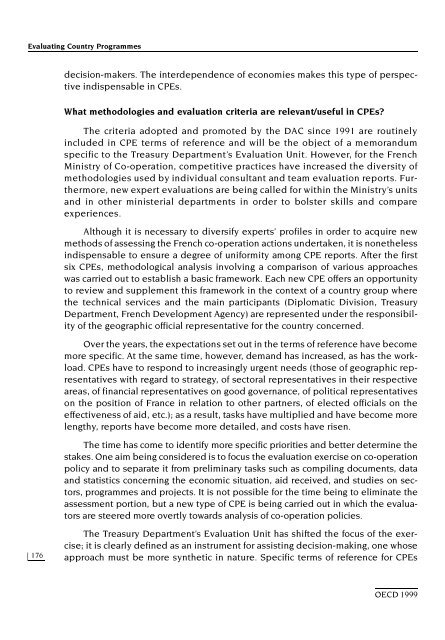



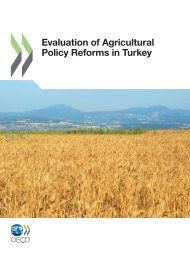
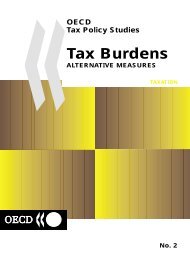
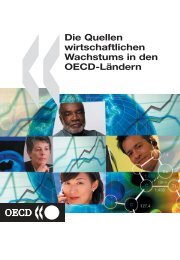
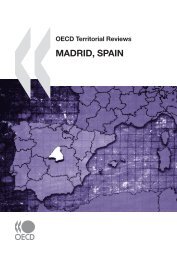



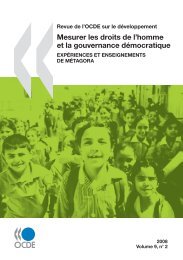
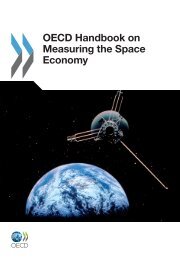
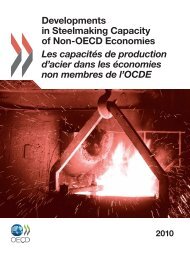
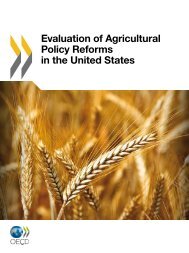
![CQE=U]^\]Z: KAZAKHSTAN - OECD Online Bookshop](https://img.yumpu.com/3915768/1/190x253/cqeuz-kazakhstan-oecd-online-bookshop.jpg?quality=85)